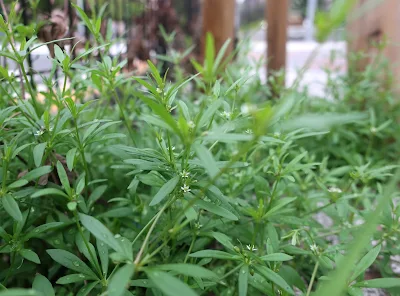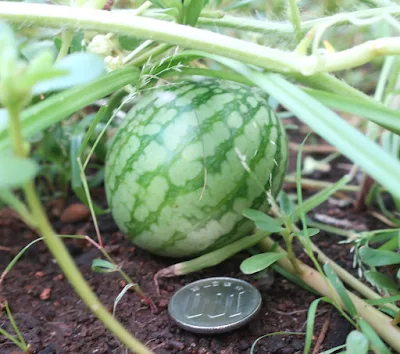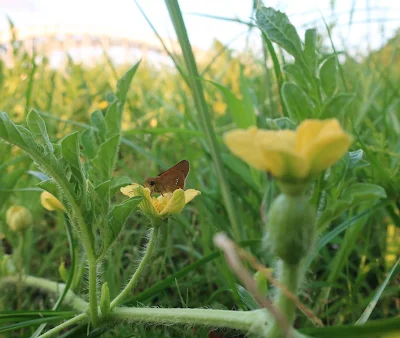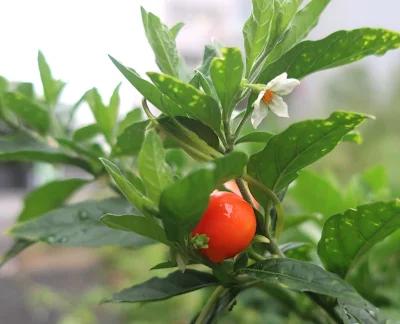It's starting to feel like autumn is coming these days. A bamboo-leaf oak tree (Quercus myrsinifolia) has started to have baby acorns.
Hi! I'm Kei Narujima. This is a blog about flowers/plants🌼and bugs🐛, and sometimes art and unique Japanese culture that make you smile or think (or so I hope)!! こんにちは。花や虫、そして時々日本の文化などについて書いてます😊。税務英語については https://zeimueigo.blogspot.com/ をご覧ください。
Bamboo-Leaf Oak (Quercus Myrsinifolia) シラカシ(白樫)
英語の後に日本語が続きます。
It's starting to feel like autumn is coming these days. A bamboo-leaf oak tree (Quercus myrsinifolia) has started to have baby acorns.
It's starting to feel like autumn is coming these days. A bamboo-leaf oak tree (Quercus myrsinifolia) has started to have baby acorns.
American Black Nightshade (Solanum Americanum) カンザシイヌホオズキ(簪犬酸漿)
英語の後に日本語が続きます。
Revised on 29 August 2024
I initially published this post a couple of days ago and since then something's been bothering me. These fruits grow upward while the fruits on the black nightshades I saw other times all grew downward. That made me wonder if these are really black nightshade. I did research and learned they were black nightshade, but the American one, i.e., American black nightshade (Solanum americanum).
Its Japanese name is kanzashi black nightshade after the fruits being shaped like "kanzashi," i.e., hair ornaments like barrettes used in traditional Japanese hairstyles.
Initially published on 27 August
Lippia (Phyla Canescens) ヒメイワダレソウ(姫岩垂草)
英語の後に日本語が続きます。
Small white flowers cover an area of a nearby park I walk through every morning, which made me wonder what they were. They're lippia (Phyla canescens). The flowers are 1cm in diameter. It's still hot in Japan but I feel like autumn is approaching these days in the early morning. Until last year, I stopped taking a morning walk for the couple of hottest weeks in August but this year I didn't.
Green Carpetweed (Mollugo Verticillata) クルマバザクロソウ(車葉柘榴草)
英語の後に日本語が続きます。
There's something I can't disregard no matter how busy I am. These are green carpetweed (Mollugo verticillata) and I can't dismiss such tiny plants. You can see how tiny the flowers are by comparing them with a 100 yen coin with 22.6mm in diameter. They seem to have five petals, but they're actually calyxes. Despite their innocent appearance, the green carpetweed is very hardy and invasive.
There's something I can't disregard no matter how busy I am. These are green carpetweed (Mollugo verticillata) and I can't dismiss such tiny plants. You can see how tiny the flowers are by comparing them with a 100 yen coin with 22.6mm in diameter. They seem to have five petals, but they're actually calyxes. Despite their innocent appearance, the green carpetweed is very hardy and invasive.
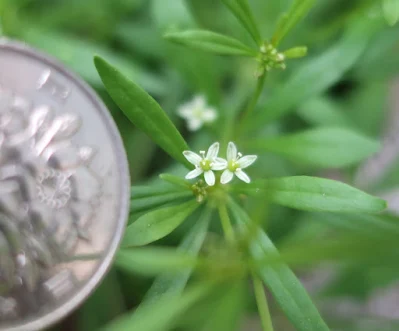 |
| Green carpetweed (Mollugo verticillata) クルマバザクロソウ(車葉柘榴草) |
Pink Pavonia (Pavonia Hastata) ミニフヨウ(ミニ芙蓉、矢の根梵天花)
英語の後に日本語が続きます。
Thanks to the torrential rain a few days ago, the pink pavonia (Pavonia hastata) has produced flowers. The translucent petals (2nd photo) were beautiful against the deep green leaves.
Thanks to the torrential rain a few days ago, the pink pavonia (Pavonia hastata) has produced flowers. The translucent petals (2nd photo) were beautiful against the deep green leaves.
Plantpot dapperling (Leucocoprinus birnbaumii) コガネキヌカラカサタケ (黄金絹唐傘茸)
英語の後に日本語が続きます。
The weather is very hot, humid and unstable this summer in Japan. Torrential rain fell last night in Tokyo, causing flooding in some areas and affecting the public transportation system. Well, rain, especially heavy rain, does no good to people living in cities, but for mushrooms, rain is a blessing. These are (I believe) plantpot dapperling (Leucocoprinus birnbaumii).
The weather is very hot, humid and unstable this summer in Japan. Torrential rain fell last night in Tokyo, causing flooding in some areas and affecting the public transportation system. Well, rain, especially heavy rain, does no good to people living in cities, but for mushrooms, rain is a blessing. These are (I believe) plantpot dapperling (Leucocoprinus birnbaumii).
They're beautiful cream yellow (see the 2nd and 3rd photos) and pretty big, like 8cm in diameter (see the 1st photo to compare with a 100 yen coin with 22.6mm in diameter). The mushroom lives only for 1 to 3 days, so they should be gone tomorrow.
Queen Coralbead (Cocculus Trilobus) アオツヅラフジ(青葛藤)
英語の後に日本語が続きます。
I saw these flowers but assumed they were Abelias because they're among Abelia flowers. But these are much tinier than Abelias (see the 3rd photo) and their shape is different. They're queen coralbead (Cocculus trilobus). In autumn, the queen coralbead produces green fruits which turn deep purple like smaller blueberries but are toxic.
I saw these flowers but assumed they were Abelias because they're among Abelia flowers. But these are much tinier than Abelias (see the 3rd photo) and their shape is different. They're queen coralbead (Cocculus trilobus). In autumn, the queen coralbead produces green fruits which turn deep purple like smaller blueberries but are toxic.
A Common Straight Swift in A Japanese Bindweed ヒルガオで朝ご飯のイチモンジセセリ
Japanese follows English. 英語の後に日本語が続きます。
I took these pictures on my way home from a Catholic church in my neighborhood. I went to the church to participate in a Mass although I'm not a Christian (though I went to Catholic kindergartens). And I was born into a Buddhist family but have never considered myself a Buddhist. You would say I'm an atheist. I may be but I also believe in something greater than ourselves, like Yaoyorozu no Kami, i.e., an infinite number of Gods, or a kind of Shinto which has existed since before Buddhism was introduced into Japan in 538 before being politicized before the war.
I took these pictures on my way home from a Catholic church in my neighborhood. I went to the church to participate in a Mass although I'm not a Christian (though I went to Catholic kindergartens). And I was born into a Buddhist family but have never considered myself a Buddhist. You would say I'm an atheist. I may be but I also believe in something greater than ourselves, like Yaoyorozu no Kami, i.e., an infinite number of Gods, or a kind of Shinto which has existed since before Buddhism was introduced into Japan in 538 before being politicized before the war.
So I went there and sang hymns and went to shrine to pray there, too. Then, I found this common straight swift (Parnara guttata) breakfasting (devouring?) in a Japanese bindweed flower (Calystegia pubescens).
Snails カタツムリ
Watermelon (Citrullus Lanatus) スイカ(西瓜)
英語の後に日本語が続きます。
Honestly, I don't feel like taking a morning walk these days because it's so hot that I can't expect to find any plants for this blog. But I still go out for a walk because almost every day something unexpected happens like this morning I've found these MINI watermelons🍉!!
Honestly, I don't feel like taking a morning walk these days because it's so hot that I can't expect to find any plants for this blog. But I still go out for a walk because almost every day something unexpected happens like this morning I've found these MINI watermelons🍉!!
You can see how MINI by comparing them with a JPY100 coin, 22.6mm in diameter. They're mini but ripe, i.e., having stripes! I also found a leftover watermelon (2nd photo) of a bird or a mouse(?). The 4th photo shows a watermelon still in the process of growing. It's not round in the beginning.
Bottlebrush (Callistemon) ブラシノキ(金宝樹)
英語の後に日本語が続きます。
The bottlebrush (Callistemon) usually flowers from May to July, so finding these was a happy surprise. The fully bloomed flowers look like brushes as the name suggests while the flowers that start to open (in these photos) are like tangled yarn balls.
The bottlebrush (Callistemon) usually flowers from May to July, so finding these was a happy surprise. The fully bloomed flowers look like brushes as the name suggests while the flowers that start to open (in these photos) are like tangled yarn balls.
 |
| Bottlebrush (Callistemon) ブラシノキ(金宝樹) |
Female Watermelon Flowers and Common Straight Swift スイカ(西瓜)と一文字セセリ
英語の後に日本語が続きます。
I'm very happy I was wrong😆. Today, I found a couple of female flowers and baby watermelons🍉!! A few days ago, I found watermelon flowers but at that time only the male ones. I had hope however that I might be able to see the female ones, so kept observing them and voila!! This morning, I found a few female flowers plus a common straight swift (Parnara guttata) on one of them 𝅘𝅥𝅯𝅘𝅥𝅯 (3rd photo)!
I'm very happy I was wrong😆. Today, I found a couple of female flowers and baby watermelons🍉!! A few days ago, I found watermelon flowers but at that time only the male ones. I had hope however that I might be able to see the female ones, so kept observing them and voila!! This morning, I found a few female flowers plus a common straight swift (Parnara guttata) on one of them 𝅘𝅥𝅯𝅘𝅥𝅯 (3rd photo)!
As you see, the watermelon is dioecious, i.e., male and female flowers growing on a single plant (2nd photo). And unlike bitter gourds, which are also in the gourd family as watermelons are, it's very difficult to tell the male from the female only based on their appearances without looking at the back of the flowers where a fruit grows. Bitter gourd female flowers have yellow green centers (whereas a watermelon has a yellow center; see the 4th photo). From today on, I'll keep watching the growth of these baby watermelons!!!
Jerusalem Cherry (Solanum Pseudocapsicum) タマサンゴ(玉珊瑚)
英語の後に日本語が続きます。
These are flowers and fruits of Jerusalem cherry (Solanum pseudocapsicum). The flowers resemble those of black nightshade (although the fruits do not). The Jerusalem cherry is called "Tama sango" in Japanese, meaning "ball coral" after the fruit shape and it being as beautiful as coral. The fruit is inedible, i.e., poisonous as other plants in the Solanum family, but pleases your eyes with the color change until December.
Fig (Ficus Carica) イチジク(無花果)
英語の後に日本語が続きます。
They're not mine but I can't help but go and see their growth every morning, which at last made me yesterday go to a grocery store to get figs (Ficus carica) but in vain. The weather is too terrible for figs to ripen, said a store clerk. A fig is written in Japanese "無花果," meaning "no flower fruit," but you are actually looking at the flowers when looking at these pictures. A fig fruit is actually not a fruit but inverted flowers😮.
 |
| Fig (Ficus carica) イチジク(無花果) |
Watermelon (Citrullus Lanatus) スイカ(西瓜)
英語の後に日本語が続きます。
I knew immediately that the plant was in the gourd family but didn't know what it was. I did research and learned according to the pinnately lobed leaves (3rd photo) that it was watermelon (Citrullus lanatus). Watermelons fruit about one month after flowering. I quickly went through all the pictures I took but found no female flowers😂.
I knew immediately that the plant was in the gourd family but didn't know what it was. I did research and learned according to the pinnately lobed leaves (3rd photo) that it was watermelon (Citrullus lanatus). Watermelons fruit about one month after flowering. I quickly went through all the pictures I took but found no female flowers😂.
 |
| Pinnately lobed leaves ギザギザの葉 |
MINI Pomegranate (Punica Granatum) ミニザクロ(ミニ柘榴)
英語の後に日本語が続きます。
The flowers are bright orange as the usual ones, but the flowers and the fruits (2nd photo) are both so mini! They're MINI pomegranate (Punica granatum). The tree is also small, so I would have taken one or two if I had had lower moral values😆.
The flowers are bright orange as the usual ones, but the flowers and the fruits (2nd photo) are both so mini! They're MINI pomegranate (Punica granatum). The tree is also small, so I would have taken one or two if I had had lower moral values😆.
登録:
コメント (Atom)
Kawazu Cherry (Cerasus x Kanzakura 'Kawazu-Zakura') カワヅサクラ(河津桜)
英語の後に日本語が続きます。 Kawazu cherry is a crossbreed of Oshima cherry (Prunus speciosa) and Taiwan cherry (Prunus campanulata) and named in 1972 ...

-
英語の後に日本語が続きます。 I read "A Pale View of Hills" by Kazuo Ishiguro a few years ago. The book was my second Ishiguro's book after...
-
Japanese follows English. 英語の後に日本語が続きます。 Is he being boiled to death? (This is a revised version of the story originally posted on Se...









